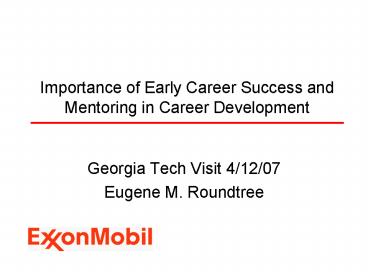Importance of Early Career Success and Mentoring in Career Development
1 / 18
Title:
Importance of Early Career Success and Mentoring in Career Development
Description:
Selected NU for co-op program, near home and mentor in faculty ... Formal / informal {Doing business in the office/traveling and in social settings} ... –
Number of Views:201
Avg rating:3.0/5.0
Title: Importance of Early Career Success and Mentoring in Career Development
1
Importance of Early Career Success and Mentoring
in Career Development
- Georgia Tech Visit 4/12/07
- Eugene M. Roundtree
2
Overview
- What I Do for ExxonMobil
- Job History How did I get to this position?
- Getting off to a good start in the workplace
- Success factors
- Mentoring
3
What do I do for ExxonMobil?
- I am a Licensing Manager in the Technology Sales
Licensing Department of ExxonMobil Research
Engineering Co. - Chemical Engineer Distinguished Engg Associate
- 32 years of experience with EMRE
- As a Licensing Manager my role involves
- Marketing and licensing of proprietary refining
technologies - Refining technology development and portfolio
management - Project management of basic engineering for
refining projects - Chairman of the Professional Development
Committee of the Black Employee Success Team
(BEST)
4
Career History How did I get to this position?
- B.S. ChE from Northeastern University in Boston
(1975) - Selected NU for co-op program, near home and
mentor in faculty - Co-oped for 4 years with Arthur D. Little
(Consulting Research) - Developed a passion for engineering management
and research - Joined Exxon Corporation in 1975
- Had the option of working in a refinery or
research engineering - Selected research engineering in N.J.
- Exxon internal management development was key
factor for me.
5
Career History
- 1975 1978 Hydroprocessing Section
- 1978 1980 Planning Engineering Coal
Utilization - 1980 1983 Fluid Cat Cracking Licensing
Group Head - 1983 1985 FCC Specialist in London
Office - 1985 1987 Planning Engineering
- 1987 1989 Fluid Cat Cracking Licensing
Group Head - 1989 1991 Gas Processes Section
Section Head - 1992 1996 Coking Section Head
- 1996 Present Technology Sales Licensing
6
Getting Off to a Good Start in the Workplace
- Keys to managing the transition from academic to
professional life - Recognizing key differences between college and
workplace - Developing an personal transition plan for the
first year - Identifying key success factors in your new
organization
7
Key Changes from Academic to Professional Life
8
A Twelve Step Process for a First Year Plan
9
Learning an Organizations Success Factors is a
Key to Achieving Success
- FACTORS IMPACTING SUCCESS AND CAREER MOBILITY AT
ERE (Findings of Upward Mobility Survey) - Projects / Assignments
- Company priority / significance Financial /
Bottom Line Impact - Clearly defined early assignments in one's area
of expertise - Scope, timing, sequence
- Communication
- Written Writing Skills
- Oral / presentation Skills
- Developmental options Communication Skills /
Organizational Savvy - Visibility and Exposure
- Being seen by others (e.g., upper management,
professional organizations, affiliates) - Seeing others Role models, exposure to others
in meetings and work settings
10
Success Factors (Contd)
- Recognition
- Timing and method of performance feedback
- Accuracy and consistency
- Promotions and career development
- Mentorship / Sponsorship
- Relationship (presence or absence)
- Nature and timing of guidance
- Knowledge of organization and opportunities
- Social and Political Interactions
- Support groups Presence or absence of network
organizations, - such as BEST, GOAL or WIN
- Formal / informal Doing business in the
office/traveling and in social settings - Acceptance / non-acceptance in social circles
11
The Benefits of Being Mentored
- Benefit from another persons vision, experience
and learning - Gain insight into the organizational culture
appropriate behaviors - Continue personal learning growth
- Be more involved in whats going on
- Get help focusing on career plans and career
moves - Experience a non-threatening climate to test
ones ideas, skills and viewpoints - Become energized by achievement, mastery and
personal growth - Grow in personal power, ability and confidence
- Remain mentally alert and valuable to the
organization
12
BEST Mentoring Program
- Vision
- To assist the personal and professional
development of each member through mentoring and
provide an avenue for them to successfully mentor
others based on their own experience and
expertise. - Benefits
- Provides an opportunity to build relationships
- Provides an opportunity to have a direct impact
on another employee (share learnings) - Increases our ability to recruit and retain
employees within ExxonMobil
13
Mentoring Program Approach
- Structured
- One year duration (formal)
- Defined mentor/protégé pairing process
- Clear roles and responsibilities for mentor
protégé - Suggested discussion topics
- Action Plans
14
BEST Mentoring Career Stages
15
Suggested discussion topics for monthly meetings
- Goals of relationship
- Tentative schedule
- Personal and career growth
- Understanding ExxonMobil
- Organizational trends and culture
- Unfamiliar parts of organization
- Company values, norms, preferences
- Formal and informal lines of communication
- Behaviors that contribute to success
- Advice on acquisition of professional skills
- Assimilation and/or transition issues
16
References
- Key Resources for this presentation
- How to Succeed in Your First Job by Elwood F.
Horton III and Sharon S. Naquin - Making the Most of Being Mentored by Gordon F.
Shea - Other useful references for early career success
and mentoring - How to Be a Star at Work by Robert E. Kelley
- Mentoring by Gordon F. Shea
- Making Mentoring Happen by Kathy Lacey
17
How to Be a Star at Work
18
Questions and Group Discussion































